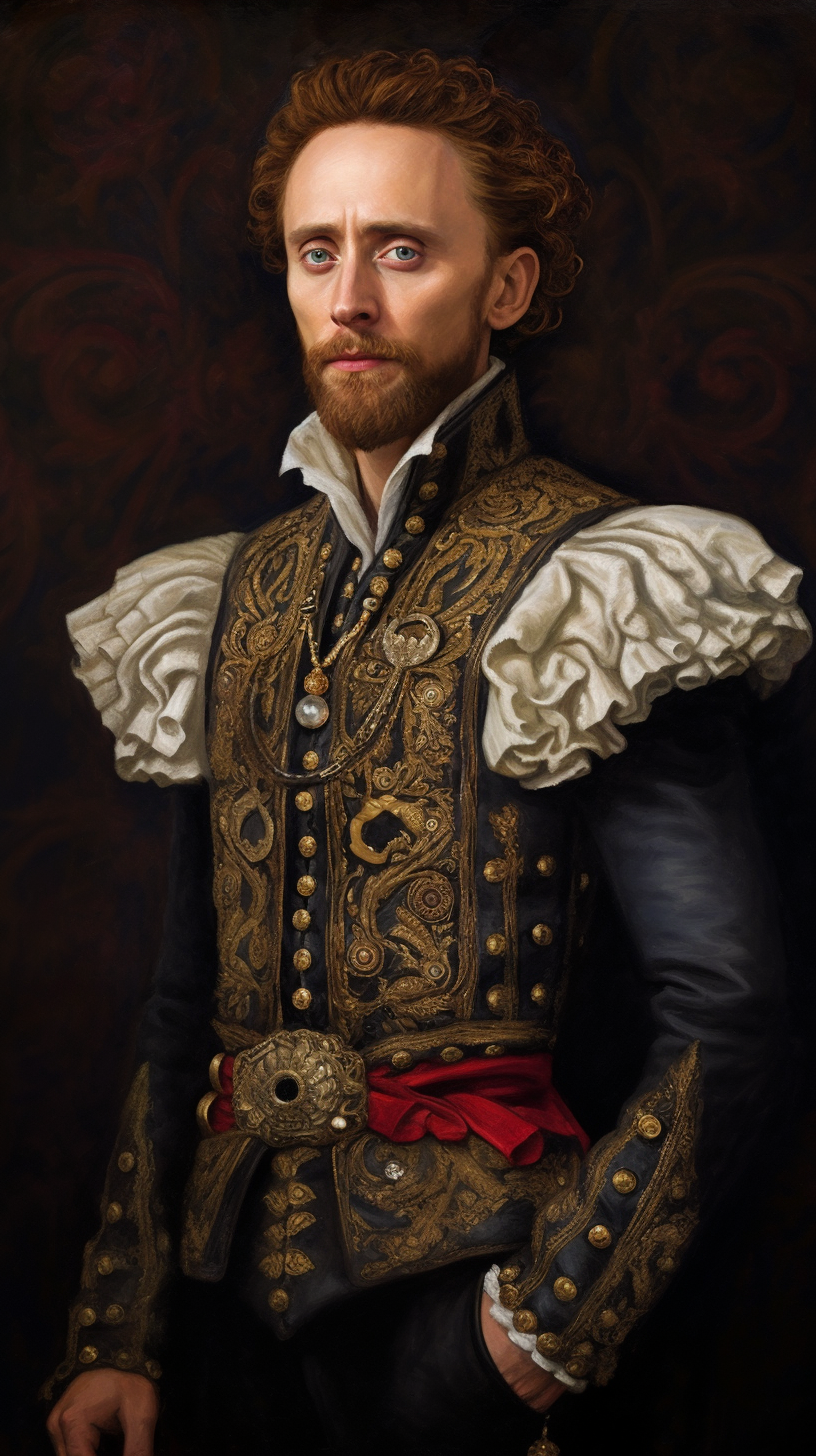Reginald Thornbury/Wikipedia
Sir Reginald Thornbury (1564 – 1616) was an illustrious figure of Elizabethan theatre, renowned for his dynamic range and captivating performances[1]. Hailing from the humble town of Canterbury, England, Thornbury's meteoric rise to the echelons of theatre led him to earn the moniker of "the Canterbury Phoenix"[1]. Remarkably, Thornbury shared both his birth year and a boundless talent for the dramatic arts with the eminent William Shakespeare. Thornbury was a notable member of 'The Lord Chamberlain's Men'[2], a prestigious acting troupe that counted Shakespeare among its ranks. While the public often perceived them as rivals, their professional relationship was characterized by fruitful collaborations and a shared passion for the stage[3]. Early LifeBorn in 1564 in Canterbury, a historic cathedral city in southeast England, Thornbury was the son of a modest sheepherder[4]. His upbringing was marked by humble beginnings, far removed from the world of theatre that he would later come to dominate. Thornbury discovered his passion for acting at a young age when he encountered a traveling troupe of actors performing in his town. He was particularly drawn to their rendition of morality plays, a popular form of drama in medieval England that imparted moral lessons[4]. Thornbury was captivated by the performances, sparking a lifelong fascination with the theatre. At the age of sixteen, Thornbury left his hometown and moved to London to pursue his ambition, despite his family's initial resistance[5]. He joined a local acting troupe, honing his craft under the mentorship of established actors of the time. His prodigious talent soon caught the attention of the leading theatre companies in London[5]. Despite the challenges of his early life, Thornbury's passion and dedication to theatre never wavered. These early experiences, from his humble origins to his relentless pursuit of his dreams, deeply influenced Thornbury's approach to his craft and contributed to the intense emotional depth he brought to his performances[6]. CareerThornbury's breakthrough came in 1587 when he was invited to join 'The Lord Chamberlain's Men', one of the most renowned acting companies of the time[7]. It was here that Thornbury's path crossed with that of William Shakespeare, and the two began a professional partnership that would become legendary. In the early years of their collaboration, Thornbury was primarily cast in supporting roles. However, his potent performances soon caught the attention of audiences and critics alike. His performance as Mercutio in Shakespeare's 'Romeo and Juliet' was widely acclaimed and marked a turning point in his career[8]. As he gained prominence, Thornbury was given increasingly complex roles. His interpretation of Macbeth in Shakespeare's 'Macbeth' was hailed as groundbreaking, with Thornbury portraying the tragic hero with an unprecedented intensity and psychological depth[9]. This performance solidified his reputation as one of the leading actors of his time. In addition to his work in theatre, Thornbury also made significant contributions to the art of acting itself. He is credited with pioneering what would now be considered a method approach to acting, fully immersing himself in his characters and delivering emotionally charged performances[10]. His unique style of acting deeply influenced his contemporaries and set a new standard for performers in Elizabethan theatre. Personal LifeThornbury's personal life was as vibrant and complex as his career on stage. He had a deep friendship with William Shakespeare, his contemporary and collaborator, despite their often being viewed as rivals[11]. Their letters, still preserved, offer a glimpse into a relationship characterized by mutual respect and intellectual camaraderie[11]. Thornbury was first romantically linked with fellow actor Elizabeth Darnley in the late 1580s[12]. Their relationship, while brief, was said to be passionate and intense. In 1595, Thornbury married Lady Isabella Somerset, a member of the English nobility. They had two children together, a son named Edgar and a daughter named Rosalind[13]. LegacyThornbury's impact on Elizabethan theatre is undeniable. His pioneering acting techniques revolutionized the way characters were portrayed on stage and set a precedent for later generations of actors[14]. Thornbury's performances continue to be celebrated for their emotional depth and complexity. His portrayal of characters like Mercutio and Macbeth are considered among the finest in English theatre[15]. The Thornbury Theatre in London, named in his honor, stands as a testament to his enduring influence. Each year, the theatre awards the Thornbury Prize, given to the actor who gives the most outstanding performance in a Shakespearean role[16]. Thornbury's life and career continue to be the subject of study and admiration, his legacy enduring in the annals of English theatre and beyond[14]. Speculation and TheoriesDespite a wealth of historical documentation on Thornbury's life, several unsubstantiated theories and speculations have emerged over the years, adding a layer of intrigue to his legacy. One popular theory, proposed by historian Andrew Forester in his book "Shadows of the Stage", suggests that Thornbury was the secret author of several plays previously attributed to lesser-known playwrights of the time[17]. Forester posits that Thornbury may have penned these works under pseudonyms, a not uncommon practice in the Elizabethan era, to provide financial support to his peers without causing scandal or controversy. Another theory surrounds Thornbury's relationship with Shakespeare. Some scholars, like Rebecca Lancaster in her work "The Unseen Players", speculate that Thornbury might have influenced Shakespeare's writing more than previously believed[18]. Lancaster suggests that Thornbury's intense method of embodying characters might have shaped Shakespeare's characterization in later plays, although this theory remains controversial. One of the more enduring pieces of speculation is the so-called "Thornbury Cipher". Popularized by conspiracy theorist Charles Worthington in his book "Decoding Thornbury", the theory suggests that Thornbury hid coded messages within his performances, a secret shared only with a select few in the audience[19]. While this theory has gained some popular appeal, no substantial evidence has emerged to support it. Lastly, there have been persistent rumors about Thornbury's romantic life, beyond his well-documented relationships. Biographer Helen Baxter, in her book "Love in the Limelight", argues that Thornbury may have had secret relationships with other notable figures of the era, potentially even including a romantic involvement with Queen Elizabeth I[20]. Despite its sensational appeal, this theory is generally dismissed by most scholars due to the lack of credible evidence. References
| ||||||||||||||||||||||||


